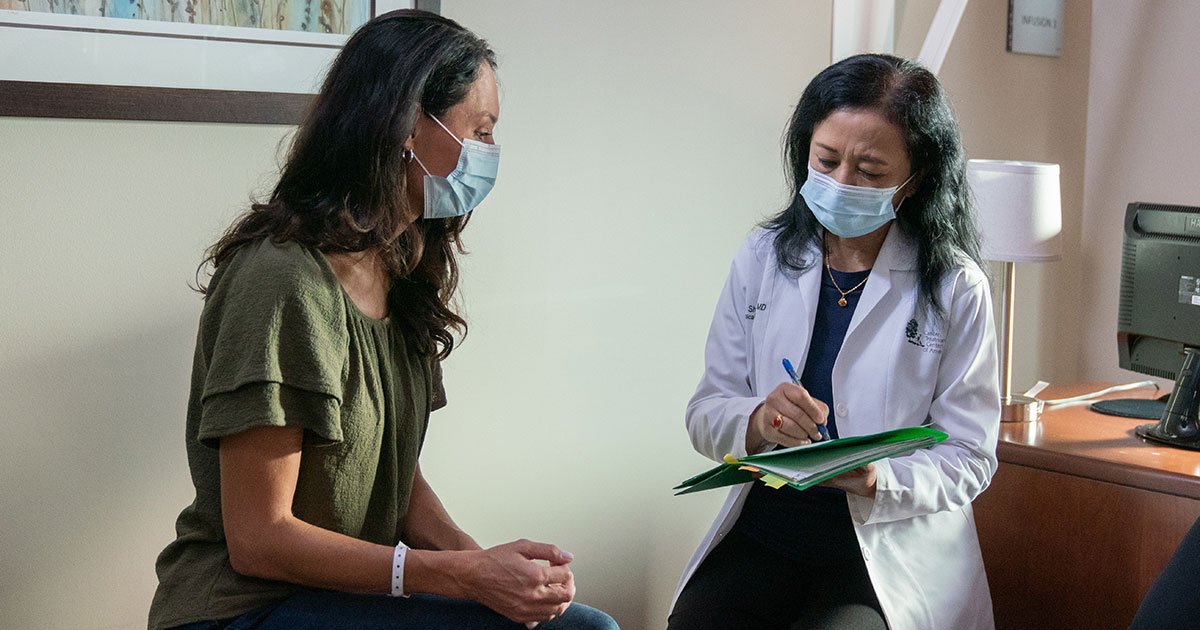Best Questions To Ask Your Breast Surgeon
What questions should you ask your breast cancer surgeon? Preparing for your first appointment with your breast surgeon is an exciting moment. It allows you to meet the surgeon who will be removing your tumor! It also should be an opportunity for you to ask questions, get more information on what options are available to you, and in some cases, you may even leave your appointment with your surgery date scheduled. Once the surgery date is on the books, you may even feel a sense of calmness and relief knowing that the process is moving along and there is a concrete date you can focus on. For many, the day of surgery is a celebratory day because it is the day they are removing the cancer! However, leading up to that first appointment can be overwhelming, anxiety driven and perhaps even numbing as you are grappling with your recent breast cancer diagnosis.
With appointments ranging from meeting with oncologists and your medical care team, to showing up for bloodwork, tests and waiting results, we understand that a breast cancer diagnosis is like a crash course in a foreign language. How are you supposed to know what questions to ask when you don’t yet know what you don’t know! Don’t worry, that is where we come in!
QUESTIONS TO ASK YOUR BREAST SURGEON
Questions About Your Surgeon
· Do you specialize in this type of surgery?
· How many operations like the one I am considering have you performed?
Questions to Ask Before Surgery:
· Do I need any other tests before this surgery?
Why Should I Choose Memorial Sloan Kettering For Breast Cancer Surgery
MSK physicians, nurses and other healthcare professionals are experts in breast cancer surgery, reconstruction, radiation oncology and more.
As the worlds largest nonprofit cancer center, we provide leading-edge breast cancer surgery. For many women, we can offer innovative procedures to save or reconstruct the breast. Our full-time staff of breast surgeons has extensive experience and expertise in all types of breast cancer surgery. This gives the 3,300 patients treated through our Breast Cancer Service each year the best possible outcomes.
MSKs breast surgery experts have helped develop national guidelines to help women with breast cancer avoid unnecessary repeat surgeries after lumpectomy while still minimizing the risk that the cancer will return.
Our innovative programs help reduce the need for women to have their lymph nodes removed as part of breast cancer surgery. In addition, we closely monitor women who do have lymph nodes removed for signs of lymphedema so that we can treat it early.
Choose MSK for breast cancer surgery because we offer:
Questions To Ask The Cancer Surgeon
Before surgery, your surgeon should give you:
- Specific instructions to follow in the days before surgery
- An overview of the surgical procedures
- Information about recovery and follow-up care
After surgery, call your doctor right away if you see signs of swelling, a buildup of fluid, redness, or other symptoms of infection.
Don’t Miss: Can You Get Rid Of Breast Cancer
Should I Have Chemotherapy Before Breast Cancer Surgery
Although breast cancer treatment usually starts with surgery, there are some situations in which your doctor may recommend chemotherapy first. For example, if you have a large tumor and small breasts, chemotherapy may shrink the tumor enough to make a lumpectomy possible. Having chemotherapy as the first treatment for breast cancer may destroy cancer in the lymph nodes, which may help some women avoid having their lymph nodes removed. For women with some types of advanced breast cancer such as inflammatory cancer, having chemotherapy as the first step in treatment is standard to be sure all the cancer cells can be removed surgically. In studies involving thousands of women, this has been shown to be just as safe as having surgery first.
Make Sure You Get The Answers To Your Questions

Healthcare professionals know its important for your wellbeing to have your questions answered.
If you dont feel you have had an answer to your question, ask again.
Sometimes its not possible to give a definite answer, but your treatment team should be able to explain why if this is the case.
If you have any questions you feel have not been answered, or would like to talk through any concerns, call our Helpline on 0808 800 6000.
Also Check: Whats Stage 3 Cancer
Questions To Ask Your Doctor
Questions To Ask About Tests For Breast Cancer
- Which tests do I need to have?
- What will the test show?
- What are the risks of the test?
- What will the test involve?
- How much will the test cost?
- How will I feel during/after the test?
- Can I bring a friend/family member with me while I have the test?
- Can you write my test results down?
- Will the results of my tests make any difference to what treatments I can have?
You May Like: Hormone Therapy Metastatic Breast Cancer
What Is Breast Reconstruction
Breast reconstruction may help restore the look and feel of the breast after a mastectomy. Many women who have had a breast removed opt for breast reconstructionin some limited cases, at the same time as the mastectomy, but more often after the mastectomy procedure. With immediate reconstruction, a surgeon performs the first stage to rebuild the breast during the same operation as the mastectomy. A method called skin-sparing mastectomy may be used to save enough breast skin to cover the reconstruction.
Breasts may be rebuilt using saline implants or autologous tissue . Most breast reconstructions performed today use breast implants. For some reconstructions, more than one surgery may be needed.
Mastectomy with reconstruction done on the same day is an option for many women, but the best approach for an individual should be determined through a discussion of various options between the patient and her surgeon.
The decision to have reconstruction is a personal one. Some women choose not to have reconstruction. Others believe it helps their appearance and recovery.
After My Breast Cancer Surgery Will I Need Radiation Or Chemotherapy Or Both
The stage of breast cancer helps determine which treatment regimen your oncologist will recommend. After breast-sparing surgery, radiation treatments may be used to help destroy remaining breast cancer cells. Radiation therapy for breast cancer is typically given after surgery to lower the chance of a cancer recurrence. Adjuvant breast cancer chemotherapy may be used after surgery to destroy remaining cancer cells not killed during surgery.
Recommended Reading: Anne Hathaway Breast
Ask About Innovative Treatments
In addition to surgery, most women require some type of radiation.
One option for certain women is intraoperative radiation therapy , a one-time, concentrated radiation treatment you receive at the time of your lumpectomy. IORT is used to treat early-stage breast cancer and lower the risk of recurrence by targeting the area of the breast most at risk for recurrence, while sparing healthy tissue and organs.
If you receive a single dose of IORT, it is often the only radiation you will need.
How Much Experience Do You Have Treating My Type And Stage Of Breast Cancer
Oncologists who are experienced in not only treating breast cancer but in your specific type of breast cancer are typically better equipped to explain and deliver the full range of treatment options. You should feel comfortable asking your doctor about his or her experience. Doctors and the hospitals they may work for are not required by law to publish the survival rates of the patients they treat, but some choose to do so. Others may be willing to provide these statistics upon request.
You May Like: Grade 3 Breast Cancer Prognosis
What Stage Is My Cancer And What Does It Mean
Breast cancer staging is a way to describe the severity or extent of your cancer. Knowing the cancer stage will help your care team recommend a personalized treatment plan specific to your disease. Breast cancer diagnosed as stage 1 or stage 2 is considered early stage, while stages 3 and 4 are considered advanced.
Questions For Patients With Ductal Carcinoma In Situ Stage 0 Breast Cancer

- I understand that my breast cancer is non-invasive DCIS . What are the chances of my cancer coming back after surgery as DCIS or invasive breast cancer?
- Is my breast cancer hormone receptor positive ?
- What are my treatment options? What do you suggest for me and why?
- What are the benefits of each treatment option? What are the drawbacks/side effects of each one?
- How long do side effects of each treatment option last? Do they go away once treatment is complete?
- Is it OK to wait a few weeks to consider my treatment plan options before I have to make a decision about treatment?
- Am I a candidate for the Oncotype DX Breast DCIS Score test?
- If I am a candidate for the Oncotype DX test, how could we use the test results to develop my treatment plan?
- How can I get a copy of my pathology report and my Oncotype DX results ?
You May Like: Grade 1 Breast Cancer Treatment
Questions To Ask Before Breast Cancer Surgery
The moment you are diagnosed with cancer, one of the first things you think of is what medical intervention to pursue. If you decide on surgery, there are several things you need to know so that youre better prepared for the procedure. To get that information, ask your surgeon the right questions.
Below, we suggest the five most important questions you can ask during the consultation.
Theres No Such Thing As A Silly Question
After reviewing and discussing the patients case in detail, the tumor board provides a consensus treatment recommendation. The plan is unique and based on many factors.
No one element alone — staging, hormone sensitivity, HER2 status — tells the whole story, says Morikawa. For example, two patients with the same stage cancer may not receive the same treatment recommendation.
In many, if not most, cases of early stage cancer, the patient will be a candidate for surgery to remove her primary tumor. Surgery may or may not be performed first.
In some cases, drug therapy like chemotherapy might be recommended to shrink a tumor before surgery is performed, explains Morikawa, noting that additional treatment recommendations could include hormone therapy, radiation therapy or a combination of therapies.
A number of factors will determine what additional therapies a patient might benefit from, and how soon those follow-up treatments should start.
You May Like: Estrogen Positive Metastatic Breast Cancer
Is My Cancer Hormone Receptor
Ask your doctor whether your cancer has receptors. These are molecules on the cell surface that bind to hormones in the body that can stimulate the tumor to grow.
Specifically ask whether your cancer is estrogen receptor-positive or receptor-negative, or progesterone receptor-positive or receptor-negative. The answer will determine whether or not you can use medicines that block the effect of hormones to treat your breast cancer.
If your biopsy didnt include testing for hormone receptors, ask your doctor to have these tests performed on the biopsy specimen.
Some breast cancer cells have receptors or molecules on the surface that can bind to other proteins in the body. These can stimulate the tumor to grow.
For example, the American Cancer Society recommends that all patients with invasive breast cancer be tested to see if their tumor cells contain high levels of the HER2 protein receptor. This is important because there are additional treatment options for HER2-positive breast cancers.
Ask your oncologist if your cancer is HER2-positive. And if you havent been tested for HER2 protein receptors, ask your oncologist to order the test.
Questions To Ask Your Doctor About Breast Cancer
Its important to be able to have frank, open discussions with your cancer care team. They want to answer all of your questions so that you can make informed treatment and life decisions.
Here are some questions that you can use to help better understand your cancer and your treatment options. Dont be afraid to take notes and tell the doctors or nurses when you dont understand what theyre saying. You might want to bring another person with you when you see your doctor and have them take notes to help you remember what was said.
Not all of these questions will apply to you, but they should help get you started. Be sure to write down some questions of your own. For instance, you might want more information about recovery times or you may want to ask about nearby or online support groups where you can talk with other women going through similar situations. You may also want to ask if you qualify for any clinical trials.
Keep in mind that doctors arent the only ones who can give you information. Other health care professionals, such as nurses and social workers, can answer some of your questions. To find out more about speaking with your health care team, see The Doctor-Patient Relationship.
Recommended Reading: What Is The Prognosis For Stage 3 Breast Cancer
Surgery Choices Questions To Ask Yourself
- If you choose to have breast-sparing surgery, are you willing to have radiotherapy?
- If you decide that mastectomy is the way to go, think about how important your physical appearance is to you after surgery. Do you think that breast reconstruction surgery is a good idea? Would you like immediate breast reconstruction or would you rather delay the reconstruction process? Keep in mind that a mastectomy is a major surgery following which youâll have to deal with both your physical and emotional recovery. If you decide to delay breast reconstruction, you might want to consider sourcing special bras or a breast prosthesis ahead of time.
- Do you need professional supportive and emotional help? What about your family? Who can you contact if you do?
Make sure to jot down your own questions before meeting your surgeon or doctor.
Let’s Be Friends
This Works Perfect Cleavage Firming Lotion
Browse Categories
Questions To Ask Your Doctor About The Oncotype Dx Breast Cancer Test
The Oncotype DX test is a genomic test that may help guide treatment decisions for patients with non-invasive breast cancer, often referred to as ductal carcinoma in situ , and help early-stage invasive breast cancer patients with estrogen receptor-positive disease evaluate if they will benefit from chemotherapy. The decision whether or not to order the Oncotype DX test is one that you and your doctor should make together.
You May Like: Neoplasm Breast Cancer
Questions You Should Discuss With Your Physician
Here are some of the questions you should discuss with your physician if youre considering a total mastectomy:
Moffitt Cancer Center welcomes you to schedule an appointment and discuss your questions about a total mastectomy in detail. You can call or fill out a new patient registration form online to schedule a consultation.
What Is My Estrogen Receptor And Progesterone Receptor Status

Your bodys hormones such as estrogen and progesterone may play a role in how your breast cancer progresses.
Normal cells are equipped with receptors that allow them to receive information from circulating hormones, similar to the way your phone picks up satellite signals. Cancer cells may also have hormone receptors, letting them tap into your bodys normal cell growth-regulating system.
Your ER/PR status is determined by testing a sample of breast cancer cells removed during a biopsy. If your breast cancer cells have estrogen and progesterone receptors if theyre ER/PR-positive then theyre capable of detecting estrogens signal and using it to fuel growth. If the cancer cells lack these receptors meaning theyre ER-/PR-negative they cant hear the growth-signaling message.
About 70% of breast cancer patients have positive ER/PR hormone status.
While being ER/PR-positive sounds bad, theres actually a benefit. Doctors can take advantage of the receptors presence. They can use an anti-estrogen drug that blocks the receptors and blocks estrogens growth signal. Or they can use other drugs like aromatase inhibitors that lower your bodys estrogen levels to deprive the cancer cells of fuel.
You May Like: Stage 3 Breast Cancer Treatment
Surgeons For Breast Reconstruction
Breast reconstruction is done by an oncoplastic breast surgeon or a plastic surgeon.
Oncoplastic surgeons are trained in breast cancer surgery and some types of breast reconstruction. Plastic surgeons usually do the more complex breast reconstruction operations. You may need to travel to a plastic surgery unit to have these.
In some hospitals, two surgeons may work together. A breast surgeon removes the breast . Then a plastic surgeon makes the new breast shape.
A new breast shape can be made:
- by using tissue taken from another part of your body
- with a combination of an implant and tissue taken from another part of your body.
Your surgeon will advise you on the types of reconstruction that are most suitable for you. They will show you photos of women who have had breast reconstruction.